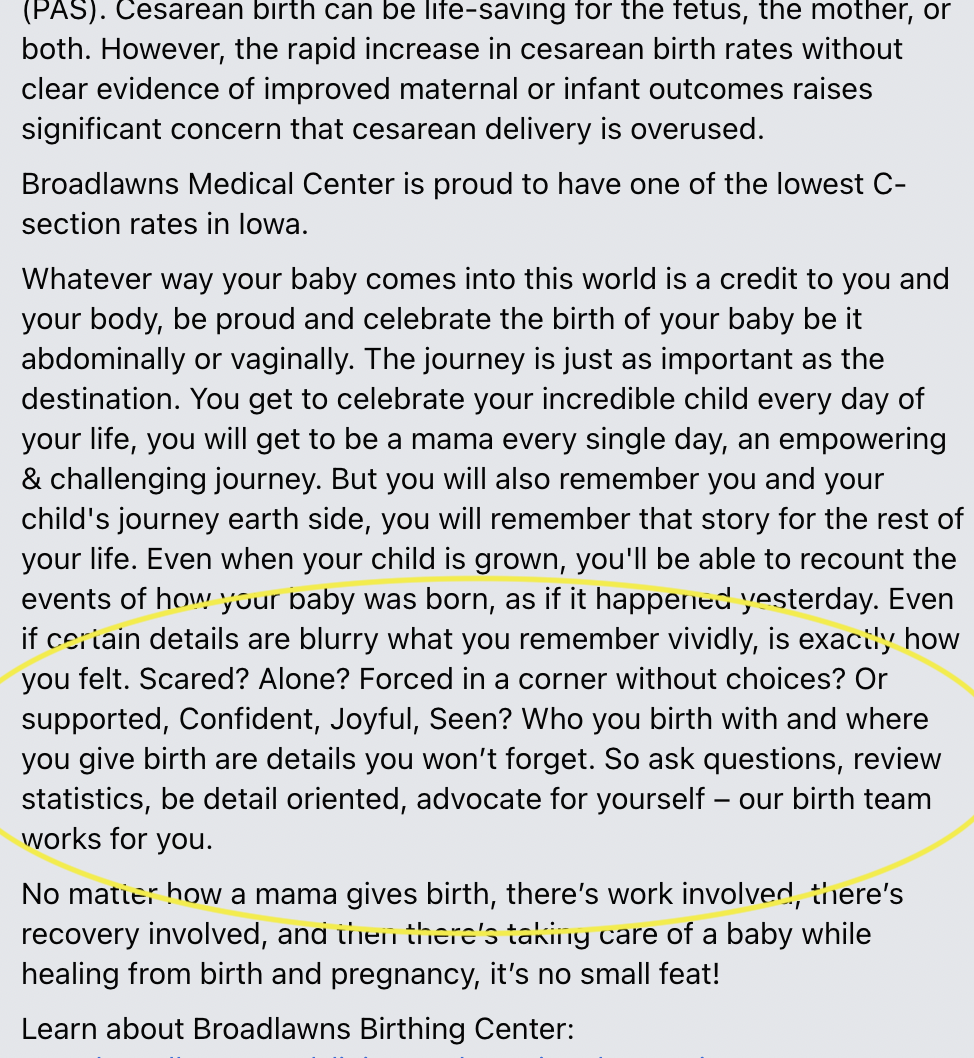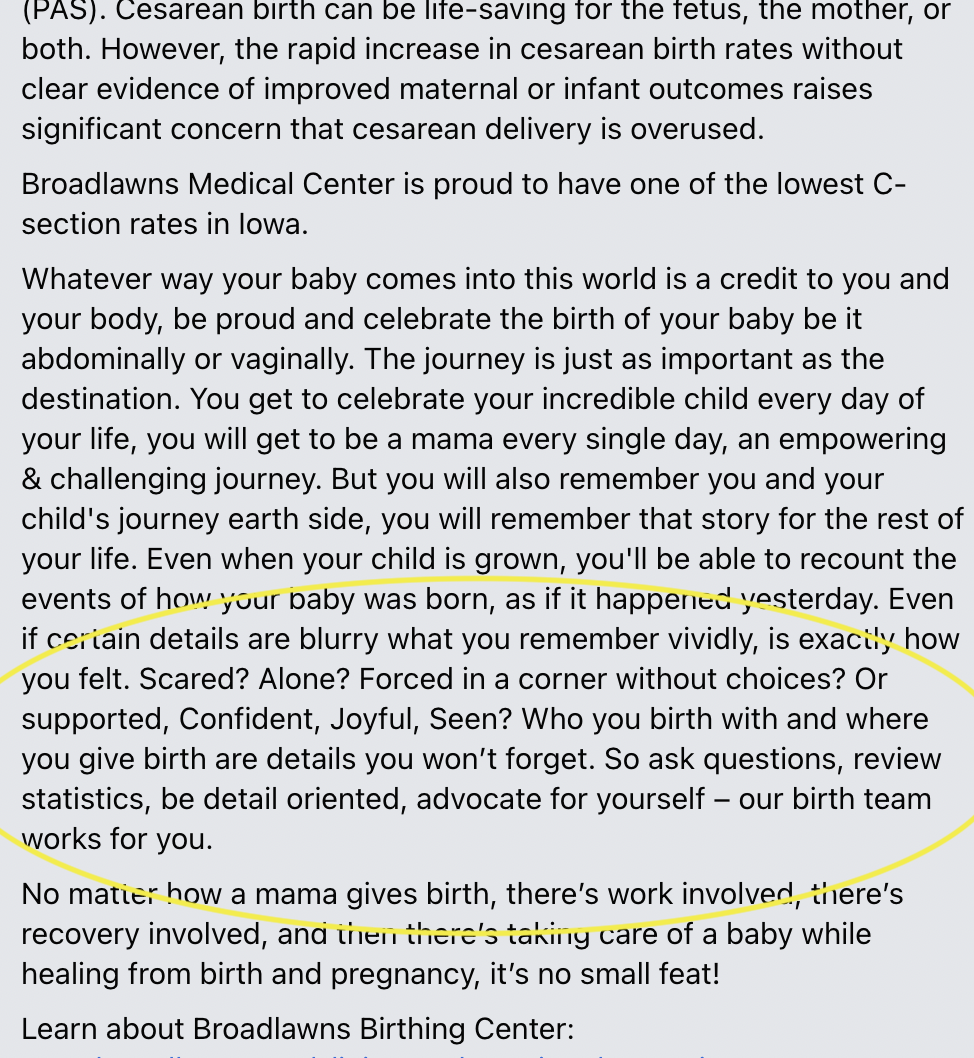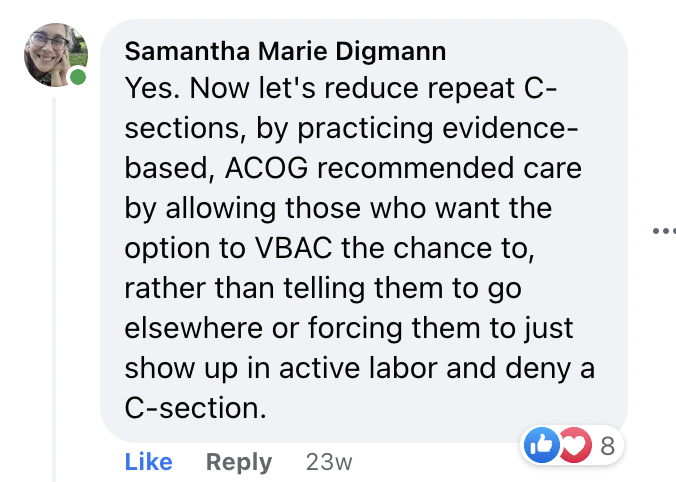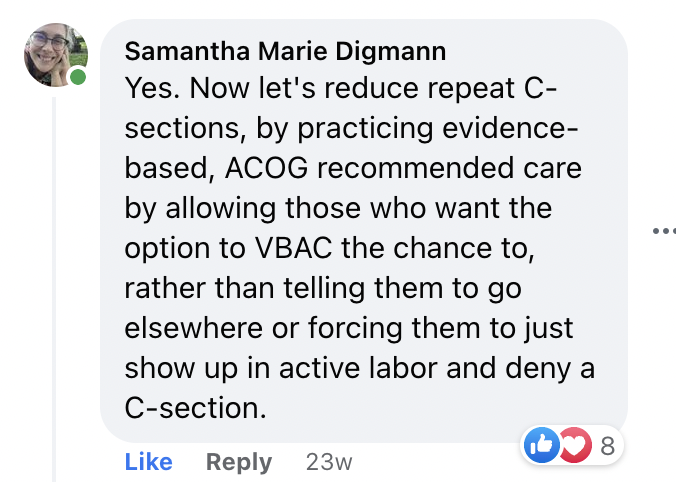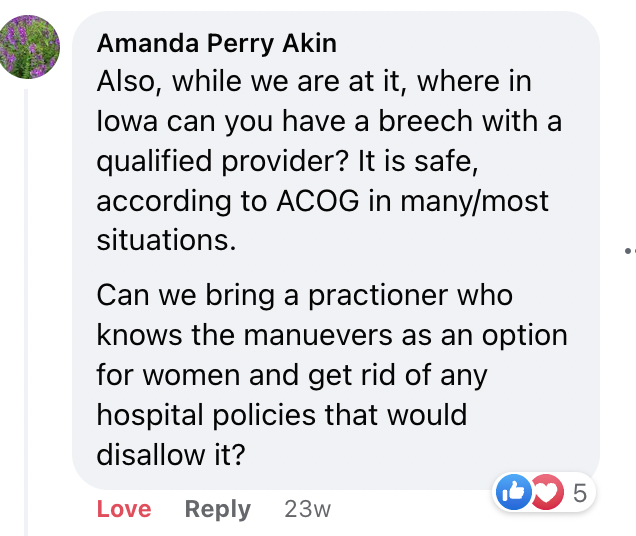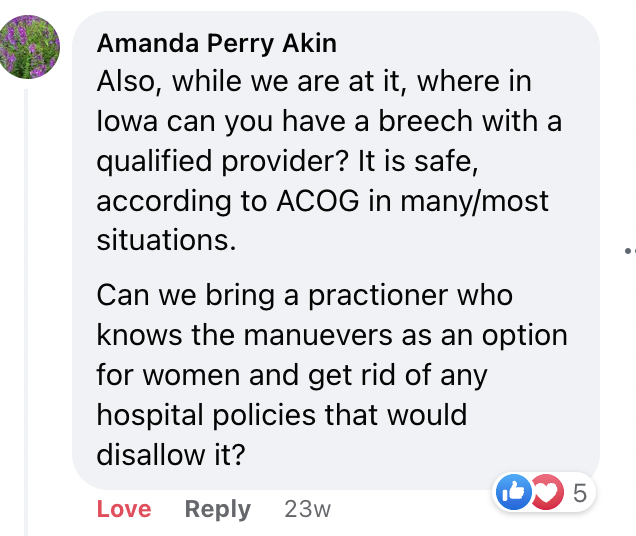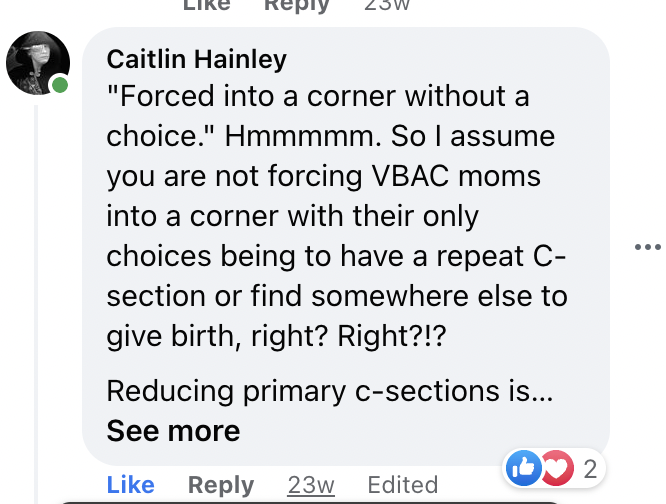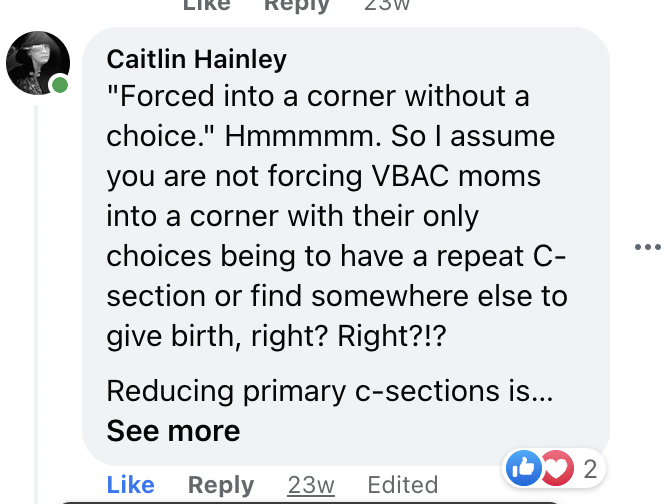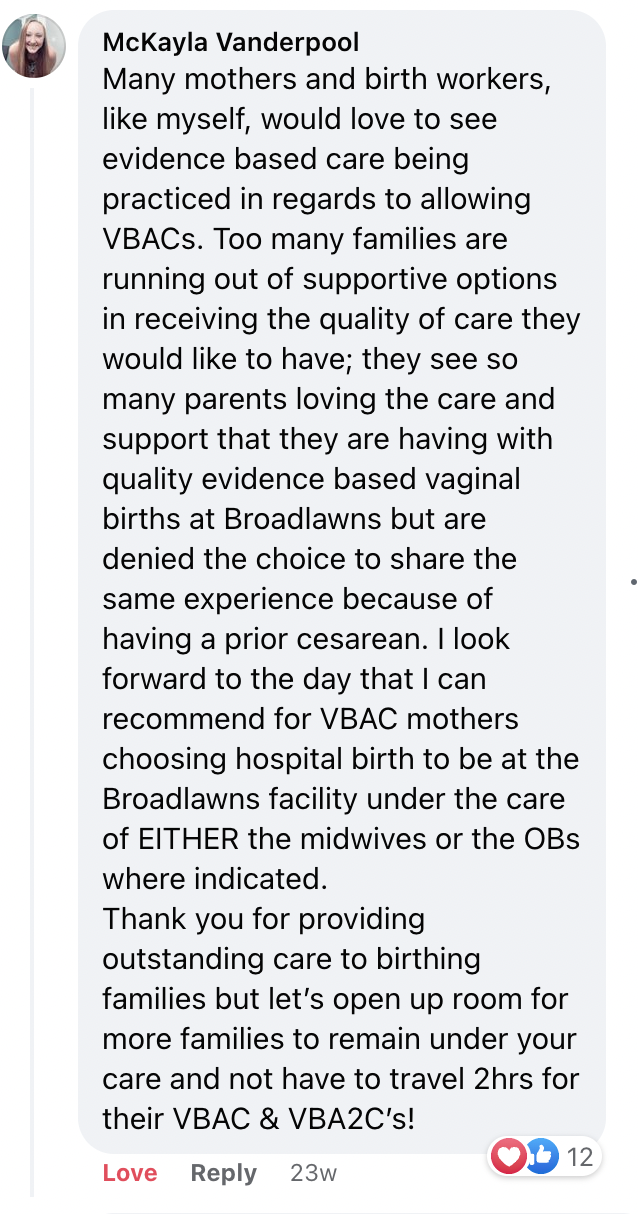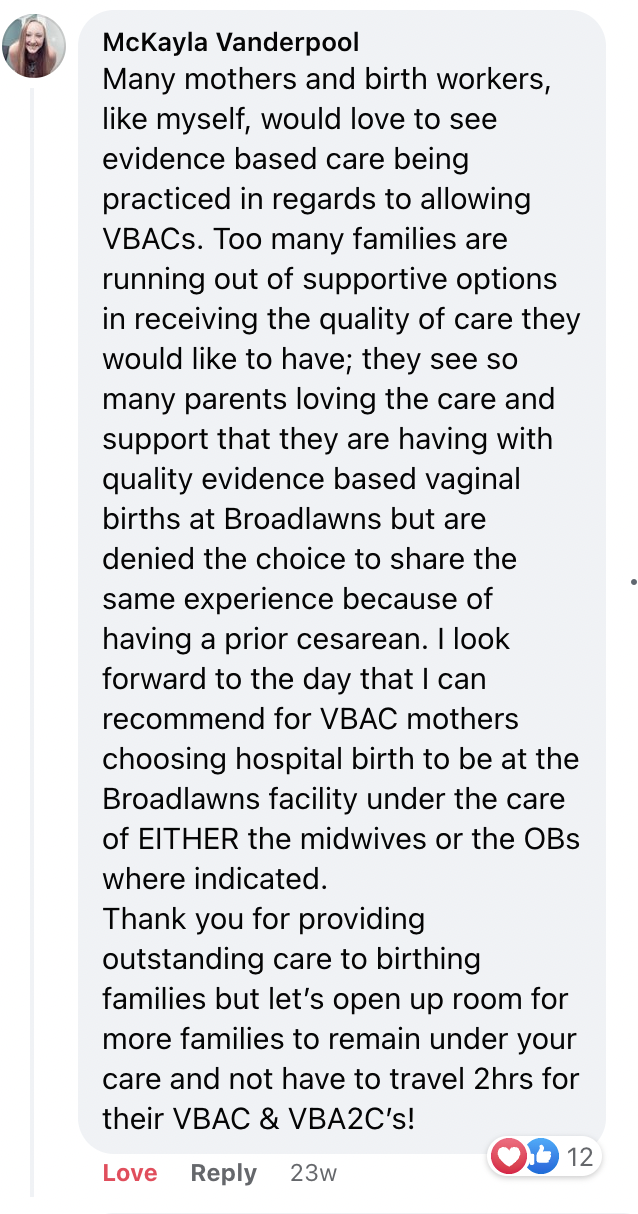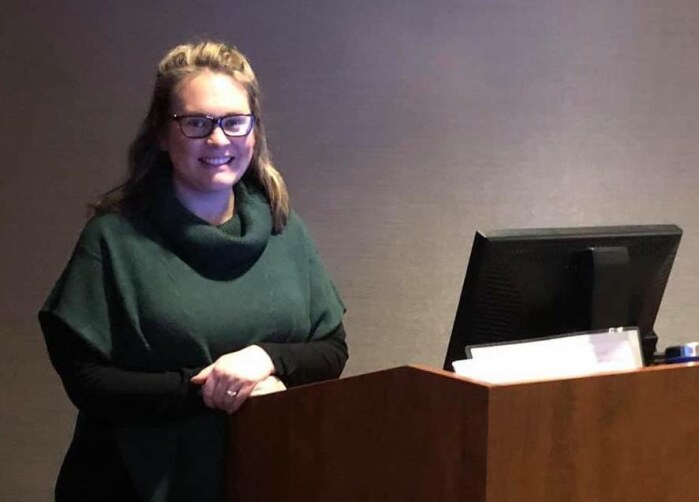Rachel Bruns is a volunteer advocate for quality maternal health care in Iowa.
In August, I spoke to the Broadlawns Board of Trustees for the third time in the past four years.
You can read my comments from my first time speaking during their citizen comment period in July 2018 when I was five months pregnant and looking for VBAC supportive care for the birth of my second child. Unbeknownst to me at the time, this experience launched my maternal health advocacy.
Flash forward a year to eight months postpartum and I, along with others, re-launched the International Cesarean Awareness Network (ICAN) of Central Iowa chapter. ICAN is a nonprofit organization whose mission is to improve maternal-child health by reducing preventable cesareans through education, supporting cesarean recovery, and advocating for vaginal birth after cesarean (VBAC) with more than 100 chapters around the world including Quad Cities and Central Iowa.
I spoke a second time during the early months of the COVID-19 pandemic regarding Broadlawns’ COVID-19 restrictions on doulas and policy recommending separation of a COVID-19 positive mother from their newborn baby, which contradicted World Health Organization recommendations. At the time, Broadlawns, UnityPoint Des Moines, and MercyOne Des Moines had the same policies to coordinate COVID response efforts across Polk County. I wrote an op-ed in the Des Moines Register regarding how these policies were exacerbating the existing maternal health crisis.
Since I last spoke to the Trustees about Broadlawns’ VBAC ban four years ago, Broadlawns upgraded its facilities to include a beautiful new birthing center. Unfortunately people with a prior c-section, who plan to have a Trial of Labor After Cesarean with hopes of a VBAC, are still not welcome there.
As a Level 1 Maternal Health facility, Broadlawns should have the capacity to support VBAC care in alignment with ACOG Guidelines for VBAC and Maternal Levels of Care. You can read my August 2022 comments or watch the video for more information.
I’m not the only one who has recently given Broadlawns feedback on the facility’s VBAC ban, as evidenced by comments in this Facebook post by Broadlawns during Cesarean Awareness Month. Broadlawns later edited the original post to remove phrases in their original post that included “our birth team works for you,” “reviewed the statistics and advocated for myself,” and “Forced into a corner without a choice.” [Editor’s note: Screenshots of the original post and some comments are enclosed below.]
This is at a time when cesareans are more expensive to Broadlawns patients and Iowa has a medically unexplainable higher low-risk cesarean rate and total cesarean rate for Black women compared to all other races.
Lack of access to VBAC care in Des Moines disprortionately impacts those with higher primary and low-risk cesarean rates the most, and finding supportive care at other area hospitals is challenging. If Broadlawns’ vision is to “be the best public hospital in the United States,” they have some work to do.
Just the other week, I read an article about a Maternal Health Panel hosted by ICAN of Santa Barbara. Two physicians commented on a Santa Barbara hospital’s recent decision to reverse their VBAC ban.
Dr. Emiliano Chavira, a Los Angeles-based OB/GYN with subspeciality training and certification in Maternal-Fetal Medicine for high risk pregnancies, stated that every obstetrician, labor and delivery nurse, and anesthesiologist should already be trained in how to handle a VBAC.
“Are they suggesting there is going to be a VBAC team or one VBAC provider? That doesn’t make sense to me,” he said. “An obstetric unit has a responsibility to prepare for emergencies of all types. That can be a hemorrhage, uterine prolapse, seizure, amniotic fluid embolism. People are supposed to be doing drills and figuring out how to respond to these emergencies. I don’t really understand how VBACs are any different.”
Local practice OB/GYN Dr. Melissa Drake echoed Dr. Chavira’s sentiments.
“You don’t need experts to do a VBAC, you need people to be very well trained in emergencies, and not simply for VBACs, but for everything because VBAC is not the most dangerous thing we do and it’s not the common emergency that will arise,” she said.
https://www.edhat.com/news/hundreds-attend-annual-maternal-healthcare-panel?fbclid=IwAR2BdENMbTX-y0jUxJ07BQA1NCCvw8CqrVta5qlfinqRjh9r8wHvVTjlbTM
While I hope maternal health advocates like me won’t need to speak at future Broadlawns Trustees meetings, I’ve seen no indication of movement for change at the hospital. We need leadership at Broadlawns to find solutions to increase access to VBAC care and improve maternal health in Polk County.
To get to these issues, ICAN of Central released a Broadlawns Trustee Candidate Maternal-Health Questionnaire (see the questions below). We produced a similar questionnaire in 2020; you can see the answers from the candidates who responded here.
Unfortunately, at this writing only one of the six candidates running for three open seats for the Broadlawns Trustees has responded to the questionnaire. You can read Bruce Schmiedlin’s response here. We will add any more that may come in.
ICAN does not endorse any candidates and facilitates this questionnaire on behalf of our chapter members, including more than 800 women. Our members want to understand how Broadlawns Trustees will address constituent concerns around maternal-health issues, both at Broadlawns and as a member of statewide organizations such as the Iowa Hospital Association. Such organizations play a significant role, for better or worse, on the quality and accessibility of care beyond the walls of Broadlawns.
If you live in Polk County and care about improving maternal health outcomes in Iowa, please consider asking the Broadlawns Trustees candidates these questions. We need elected leaders at our tax-funded county hospital to be willing to engage with constituents on issues impacting equity and outcomes on one of the biggest health crises facing our country. Of course Broadlawns is not the only hospital impacting these outcomes, but they are the only one where the public can vote for their board leadership.
Broadlawns County Hospital Trustee Candidate Maternal-Child Health Questionnaire
- As reported by the Iowa Department of Public Health, maternal mortality and morbidity is on the rise across the country and in Iowa. The leading causes of pregnancy related death between July 2018 through calendar year 2019 were preeclampsia/Eclampsia, hemorrhage, and suicide. The Iowa Maternal Mortality Review Committee also determined 100% of these cases were preventable. What role can the Broadlawns Trustees play to reduce preventable maternal deaths?
- As reported by the Iowa Department of Public Health, “structural racism and/or discrimination were determined to be a contributing factor in 40% of the cases” of maternal deaths in Iowa per its 2021 report. Per its 2020 report, Iowa’s pregnancy-related maternal mortality was 9.4 per 100,000 livebirths overall and disparities are significant by race with Black women being 6x more likely to die and Asian/Pacific Islander almost 4x more likely to die than white women. What role does the board at Broadlawns have in reducing disparities and improving maternal health outcomes in Polk County?
- Per the World Health Organization, midwives are able to provide 87% of the needs of all women and newborns. Research demonstrates that integrating midwives into pregnancy and birth care leads to higher rates of physiologic birth, breastfeeding and vaginal births after cesarean; decreased rates of obstetrical interventions; and fewer neonatal harms such as preterm birth, low birth weight, and neonatal death. Even with this evidence and the known obstetrics physician shortage in Iowa, Broadlawns limits patient access to its midwives that could be within their scope of practice and appropriate for a Maternal Level 1 hospital. What would you do as a board member to increase access to the midwifery model of care at Broadlawns?
- The c-section rate in Iowa and across the country is higher than recommended by the World Health Organization (it is recommended to be at or below 15%). In Iowa it consistently sits around 30%, but the rate at any given hospital may be significantly higher or lower. Broadlawns and the state of Iowa currently do not make cesarean rates public though some data has been provided in recent years through FOIA requests. Half of the c-sections performed in the U.S. are preventable and performing a surgical birth can pose added risks to the mother, their child, and also raises costs. The leading indicator of whether or not a cesarean will be performed is the practices of the provider. What would you do as a member of the Broadlawns board to decrease the cesarean rate at Broadlawns?
- Broadlawns has a VBAC (vaginal birth after cesarean) ban even though ACOG guidelines state that VBAC is safe for most women with a low-transverse incision from a cesarean surgery. While VBAC carries risk, repeat cesarean carries its own set of risks and complications. ACOG shared that “available data confirms that TOLAC (trial of labor after a cesarean) may be safely attempted in both university and community hospitals and in facilities with or without residency programs.” They also state, “Trial of labor after previous cesarean delivery should be attempted at facilities capable of performing emergency deliveries.” Given that Broadlawns is capable of performing emergency deliveries and the cost of a vaginal delivery is significantly less expensive than a cesarean, and Broadlawns’ mission is to provide accessible, cost-effective and high quality patient care, what will you do as a board member to increase access to a Trial of Labor After Cesarean / VBAC care for those patients that seek it?
- It has been stated that it takes obstetrics in the United States longer than other fields of medicine to catch up to implementing new guidelines and evidence-based practices. Not necessarily specific to Broadlawns, but it is not uncommon for hospitals and providers to continue outdated and non evidence-based obstetrics practices. Examples may include not allowing laboring patients food, non-consensual pelvic/cervical checks, stripping of membranes, early/routine inductions for suspected “big baby”, limiting laboring/birthing in water, etc. What would you do as a board member to ensure the Broadlawns Women Health department follows evidence-based care and informed consent (or informed refusal as applicable)?
Top photo of Rachel Bruns provided by the author and published with permission.
Appendix: Screenshots of a Facebook post by Broadlawns and some comments posted by community members
